#Concrete Paver Block Manufacturers
Explore tagged Tumblr posts
Text
Leading Refractory Pan Mixer Manufacturer in the Industry
Pan-Mixer is stands as a leading refractory pan mixer manufacturer in the industry. We are providing top quality equipment to design for efficient mixing and superior durability. Our mixer was a designed to handle the meticulous demand of refractory materials. We can ensure that our machine are provide reliable mixing solution and durability for construction needs. We could make sure that each machine are uniform and precise mix every time. Our pan mixer was advance features and robust construction techniques that perfect solution for industries requiring reliable performance and long lasting durability. Pan-Mixer is providing the refractory pan mixer that compete various needs of small scale projects or large industrial applications.

We are commitment to quality and innovation has to be a trusted name in the industry. We are first prioritize customer satisfaction by providing customizable solution, seamless operations and cost effectiveness in every product. We are making machine that can be help in every construction site with their full potential. Our refractory pan mixer are designed user convenience and safety in mind, feature was easy to maintenance and efficient operation. Pan-Mixer is trusted partner to elevate your operational efficiency with our world class refractory pan mixer.
If you want to explore wide range of high quality refractory pan mixer then Visit Our Website pan-mixer.in. We are leading manufacturer in Industry we provide detailed product specifications, feature and customized solution that tackled to your specific needs. Our youtube chanel make clear information about pan mixer machine and you see their how our machine work with efficient, durable or cost-effective mixing solution with advance technologies can improve your production processes. Don’t hesitate to contact us for any inquiries or to request a quote.
#pan mixer machine#laboratory concrete mixer#fly ash mixer#sand mixer muller#pan mixer in ahmedabad#pan mixer machine suppliers#pan mixer manufacturers#paver block machinery#pan-mixer#hardic engineering
0 notes
Text
Paver Block Making Machine Manufacturer in Noida

Looking for a reliable Paver Block Making Machine Manufacturer in Noida? Our advanced machines are designed to produce high-quality, durable paver blocks with precision. We offer robust, efficient, and user-friendly machines tailored for both small-scale and large-scale production. Trust us for superior technology, excellent after-sales support, and affordable pricing. https://www.ultratilemachine.com/paver-block-making-machine-manufacturer-in-noida/
#Paver Block Making Machine Manufacturer#Hollow and Solid Block Making Machine#Fly Ash Brick Making Machine#Concrete Block & Brick Making Machine
0 notes
Text
Know About Footings Types in Construction
Footings are an essential component of foundation building. They are normally composed of concrete with rebar reinforcement, which is poured into a dug trench. Footings support the foundation and prevent it from settling. Footings are especially significant in places with unstable soils.

The building of footings by Concrete Contractors Brisbane is best left to professionals who can examine soil conditions and determine the required depth and breadth for the footings, as well as their location. The dimensions of footings are also determined by the size and kind of structure being erected. The placement of footings is critical for providing enough support for the foundation and, eventually, the building.
Four Different Types of Footings
Individual footings
Individual footings are the most popular form of footing. They are typically used for small constructions like sheds and porches. Individual footings are also employed for all four walls of a structure when the soil is extremely soft or there is a high water table.
Combined footings
Combined Concrete footings in Brisbane are utilized when two or more foundation walls are near together and share the weight. Combined footings are also employed when one of the foundation walls is much higher or longer than the others.
Strip footings
Strip footings support a long foundation wall, such as the side of a house. They are also utilized to support load-bearing walls that are parallel with one another.
Raft or Mat Foundation
A raft or mat foundation is a large slab of concrete that supports an entire structure. Raft foundations are utilized when the soil is too poor to sustain individual footings or when the structure is too massive.
How Are Footings Built?
After excavation, the first phase in building is typically to lay footings. The hole for the footing must be dug first, followed by the construction of the footing.
Once the hole has been excavated, the footing must be constructed. This can be accomplished by pouring concrete into the pit or by utilizing prefabricated blocks of concrete, stone, or brick. The footing must be flat and extend past the hole's sides to sustain the weight of the building.
The foundation walls can be erected once the footings by Concrete Contractors Brisbane are completed. The foundation walls are often constructed of concrete, although they can also be built of stone, brick, or wood. The walls must be sturdy enough to withstand the building's weight and tall enough to reach above ground so that the structure does not collapse.
#Concrete footings in Brisbane#Concrete footings#brick pavers#brick manufacturer in brisbane#brick exterior#home renovation brisbane#bricklayer brisbane#all types of brick and block walls in gold coast
0 notes
Text
Unveiling the Boundless Potential of Paver Blocks: An Extensive Overview
Paver blocks have revolutionized the construction industry, offering a vast array of applications and creative possibilities. From concrete paver blocks to grass block pavers, these versatile materials have gained immense popularity for driveways, walkways, patios, and more. If you're seeking local paver block manufacturers or wish to explore the various types of paving blocks, this comprehensive guide is here to assist you. We will delve into the advantages and characteristics of different paver blocks, shedding light on their applications and helping you make an informed decision for your upcoming project.
Concrete Paver Blocks : Concrete paver blocks are widely recognized as one of the most versatile and commonly used options available. They are manufactured using a blend of cement, aggregates, and color pigments, resulting in durable, low-maintenance surfaces with aesthetic appeal. These blocks come in diverse shapes, sizes, and patterns, allowing for endless design possibilities. With their ability to withstand heavy loads, concrete paver blocks are suitable for driveways, parking areas, and even commercial spaces. The interlocking feature ensures stability and prevents shifting, ensuring their long-lasting performance.
Grass Block Pavers : Grass block pavers, also known as turf pavers or permeable pavers, present a unique blend of functionality and eco-friendliness. These blocks feature open cells that facilitate grass or vegetation growth, creating visually appealing surfaces while enabling water drainage. Grass block pavers are particularly advantageous in areas where effective stormwater management is essential, as they help prevent soil erosion and reduce the burden on local drainage systems. They find applications in parking lots, fire lanes, and residential areas, seamlessly blending with the surrounding landscape.
Types of Paving Blocks : In addition to concrete paver blocks and grass block pavers, the market offers a diverse range of paving block options to cater to various requirements. Let's explore some popular types:
a. Interlocking Concrete Pavers: These blocks interlock tightly, providing strength, stability, and easy installation. Available in a multitude of shapes, colors, and surface finishes, interlocking concrete pavers offer limitless design possibilities.
b. Cobblestone Pavers: Cobblestone blocks exude a timeless and classic aesthetic. Renowned for their durability and ability to withstand heavy traffic, cobblestone pavers add an elegant touch to walkways, driveways, and courtyards.
c. Brick Pavers: Brick pavers exude a traditional and rustic charm reminiscent of old-world architecture. Available in various colors and sizes, they are commonly employed for patios, pathways, and landscaping projects.
d. Flagstone Pavers: Flagstone pavers boast irregular shapes and natural textures, imparting a distinctive character to outdoor spaces. They are frequently used to create natural-looking pathways, stepping stones, and pool decks.
Paver blocks have revolutionized construction and design, offering unparalleled versatility and durability. Whether you opt for concrete paver blocks, grass block pavers, or any other type of paving block, their potential is limitless. To ensure long-lasting results, it is essential to select high-quality materials from trustworthy local manufacturers. By comprehending the unique features and applications of various paver blocks, you can make an informed decision that aligns with your project requirements and enhances the aesthetic appeal of your outdoor spaces. Embrace the boundless possibilities of paver blocks and embark on a journey to create stunning, functional, and sustainable surfaces.
#Paver Block#concrete paver block#grass block pavers#paver block manufacturers near me#types of paving blocks
0 notes
Link
Ultra Tile Machine is a leading company in manufacturing chemical products. We make long-term investments goal in global organization in different areas, and other countries. We are giving cost-effective industrial solutions. Few can match for our promise to safety and commitment to your product making. We offer the cleanest line of services with newly technology, equipment.
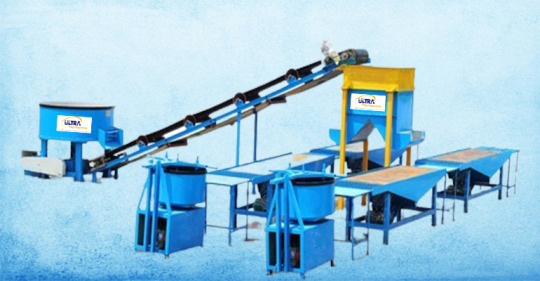
#Concrete Block Making Machine Manufacturers#Fly Ash Brick Making Machine Manufacturers#PVC Rubber Mould Manufacturers#paver block machine manufacturers
0 notes
Text
How Concrete & Brick Sealers Improve Property’s Durability, Appearance, and Long-Term Value?
In Melbourne, well-known producers and sellers provide essential building protection products like premium brick sealer, concrete grouting and driveway sealer, moisture sealing materials, and more. These manufacturers and suppliers provide a large selection of locally designed and produced building solutions to maintain building structures and enhance their longevity.
They offer a wide range of products, such as concrete, render, and paint additives, concrete sealer and hardeners, water-repellent and stain-proof sealers, waterproof concrete solutions and additives, anti-graffiti products, and rising damp treatments.
For prompt delivery right to their location, skilled and experienced concrete waterproofing contractors and building owners typically order sealers and waterproofing supplies online from these industry-leading merchants.

Why Include Local Manufacturers of Products for Concrete Preservation?
Reliable concrete protectors are essential for both interior and outdoor surface concrete because they operate as a barrier against moisture, heat, and other environmental elements that could compromise the integrity or quality of the construction.
Some respectable local sealing and waterproofing manufacturers deliver a variety of products for building materials coating, sealing off moisture grinding, raising damp protection, a concrete additive, polymer renders, timber protection, and other services necessary during building development to preserve the integrity of the concrete.
Some of these businesses are renowned for being the first in Australia to do research and manufacture water-repellent, stain-proofing sealers and building protection additives.
They provide a variety of based on water and solvent-based versatile water-repellent sealers, including silicone sealers, conventional full-proof silane treatment for building materials infrastructure, innovative silane cream water distasteful treatment for building materials infrastructure, and deep-entry water-repellent concrete sealers.
Natural stones, concrete blocks, pavers or driveways, clay bricks, terracotta, tiles, and grouts are just a few of the masonry and flooring materials for which they have created polishing solutions. These are water-based compounds that don't penetrate thick substrates very well.
Therefore, contact these sellers to get premium-quality sealing, waterproofing, and polishing products for porous brick substrates online.
Source
2 notes
·
View notes
Text
Concrete Blocks - Manufacturing, Classification & Uses
Concrete blocks are nowadays replacing bricks in masonry construction, notably in many multi-storeyed buildings. They are available in three types namely solid, hollow and cellular, widely used for the construction of filler walls and boundary walls in RC framework.
Concrete blocks are usually made in large sizes to make blockwork faster and consume less cement in joints than the brickwork. If the percentage of the voids is more than 25%, then they are hollow blocks and blocks with voids less than 25% are only perforated blocks.
The cellular concrete blocks are generally referred to as lightweight aerated concrete blocks. All these blocks are extensively used for compound walls and non-loadbearing walls.
Hollow blocks are specially made for loadbearing walls, which are useful in reducing a dead load of masonry in buildings. Blocks can also be with cement and sand called cement-sand blocks or with cement and soil called soil-cement blocks which are of low strength and use for low-cost construction.
Manufacturing of Concrete Blocks
BIS recommends a fineness modulus of the combined aggregate between 3.6 to 4 and coarse aggregates used are of size 6 to 12 mm. Lean mixes up to 1:8 are generally used. Concrete mix for concrete blocks should not be richer than one part of the cement to six parts of the volume of combined aggregate.
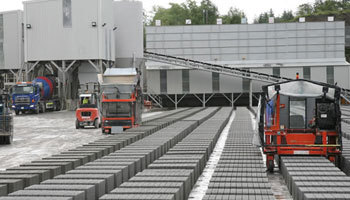
Concrete blocks can be handmade and also machine-made. The cast block is then cured in a water tank or yard for at least 14 days (water need to be changed at least every 4 days).
After curing, the blocks are dried for 4 weeks before being used in masonry construction. They should be stacked with voids in the horizontal direction to facilitate easy drying, or they should be steam cured and dried.
The whole process allows the complete shrinkage of the block to take place they are laid on the wall, which is very important for strong walls.
Classification of Concrete Blocks
Hollow concrete blocks
Open and Closed cavity-type hollow concrete blocks are classified into three grades:
Grade A - They possess a minimum density of 1500 kg/m³ and are used for load-bearing walls.
Grade B - They have a density below 1500 kg/m¬³ and used for load-bearing walls.
Grade C - These blocks are used for non-load bearing walls and have density more than 1000 kg/m³.
All these blocks are available in decorative facings like fluted facing to provide artistic effects.
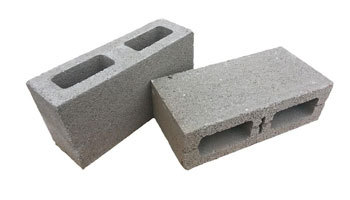
Solid concrete blocks
They should be manufactured for specific concrete strength of 4.0 and 5.0 N/mm² in 28 days. These blocks are used as load-bearing walls and have a density of not less than 1800 kg/m³.
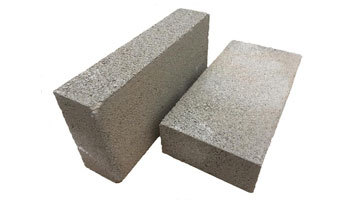
Paver blocks
These blocks are solid concrete blocks of different shapes specially made for exterior ground paving on sidewalks, parking lots, driveways, petrol pumps, industrial floors, etc.
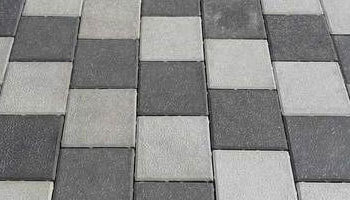
AAC Blocks
AAC blocks refer as Autoclaved Aerated Concrete Blocks. These blocks are also termed as light-weight hollow blocks.
They are prepared as solid blocks from cement, water and materials like ground sand, pulverized fly ash together with additives to aerate and stabilize the air bubbles.
The final result is a mixture of thick liquid which is then poured into steel moulds to form large cakes. After some time, the mixture sets and ready to cut into a serious of individual blocks of required size using taut steel wires.

Very light blocks for partition and moderate-weight blocks for light loadbearing walls can be obtained from aac blocks. These blocks do not shrink on drying as the material is obtained by autoclaving.
The autoclaved cement product is crystalline, which is different from the product obtained by normal wet curing or by ordinary steam curing.
Sizes and Tolerances
The nominal dimensions of concrete block as per BIS are as follows:
Length - 600, 500, 450 or 400 mm
Height - 100 or 200 mm
Width - 50, 75, 100, 150, 200, 250 or 300 mm
Actual sizes will be less than 10 mm of mortar thickness. For Concrete and Hollow concrete blocks nominal length 390 mm and height 190 mm. The thickness for loadbearing walls is 190 mm, compound walls 140 mm and for filler walls 90 mm.
These dimensions can easily be achieved in machine-made blocks than handmade blocks. The width of blocks use for load-bearing walls is 200 mm and for parapet or filler walls is 100 mm.
Points to Remember:
The mortar strength should not be more than the strength of the blocks. With high mortar strength, cracks will be less and very large, but with low mortar strength, cracks will be small and distributed.
We should use only blocks that are cured properly for at least 14 days and dried for 4 weeks to avoid shrinkage during construction.
We should not wet the blocks while placing in masonry construction.
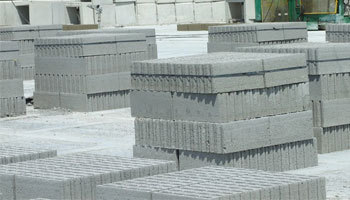
Freshly-made and uncured concrete blocks should never be allowed on the work.
Blockwork, particularly ordinary cement sand blocks and soil-cement blocks should not be used as loadbearing walls for concrete slab roof which favours to expand and contract with temperature.
The maximum difference in sizes allowed is ±5 mm in length and ±3 mm in height and width.
They should be protected from rains while being stored as they absorb moisture by wetting and shrinking on drying.
The main disadvantage of concrete blocks is shrinkage due to the movement of moisture content which is not present in bricks. As these blocks are much larger than bricks, any foundation movement will cause blockwork to crack more than the brickwork.
Cement blocks, Concrete blocks, Hollow concrete blocks, solid concrete blocks, Paver blocks, AAC blocks Concrete blocks in Hyderabad
#aac Blocks#aac blocks online#aac block size#Cement blocks#Concrete blocks#Hollow concrete blocks#solid concrete blocks#Paver blocks#AAC blocks
2 notes
·
View notes
Text
A Comprehensive Guide to Hydraulic Paver Block Making Machine
Welcome to "A Comprehensive Guide to Hydraulic Paver Block Making Machine." In the ever-evolving world of construction and infrastructure development, the significance of efficient and eco-friendly building materials cannot be overstated. Paver blocks have emerged as a popular choice due to their durability, versatility, and aesthetic appeal. At the heart of this revolution lies the Hydraulic Paver Block Making Machine – a game-changing technology that has transformed the production of paver blocks.
This article aims to delve into the intricacies of Hydraulic Paver Block Making Machine, providing a detailed exploration of their working principles, key components, and various types available in the market. We will uncover tips and some troubleshooting steps.
Moreover,we will highlight essential considerations for selecting the right machine that aligns with specific project requirements. Whether you are an industry professional seeking to optimize production processes or an enthusiast eager to grasp the mechanics behind paver block manufacturing, this guide will equip you with invaluable insights.
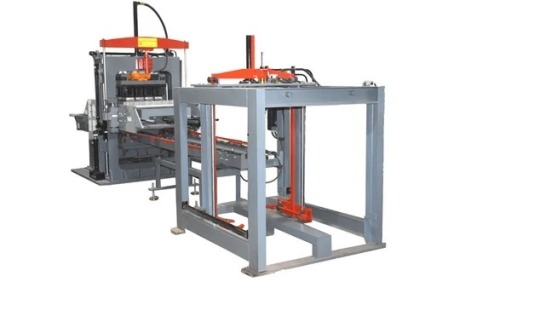
Understanding Hydraulic Paver Block Machine Specifications
When it comes to hydraulic paver block machines, understanding their specifications is crucial for making informed decisions. These machines are essential for producing high-quality, durable, and aesthetically pleasing paver blocks used in various construction projects.
Hydraulic paver block machine specifications encompass a range of key features. The capacity, which determines the number of blocks produced per hour, directly impacts productivity. The molding area size affects the dimensions and shapes of the blocks. Additionally, the power and pressure rating influence the machine's efficiency and performance.
Moreover, it's essential to consider the automation level and control system, as advanced automation ensures precision and ease of operation. The type of molds compatible with the machine allows for versatility in block design. Understanding these specifications empowers buyers to select the ideal hydraulic paver block machine that aligns with their specific project requirements, resulting in cost-effective and successful paving solutions.
Choosing the Right Paver Type: Interlocking vs. Non-interlocking
When it comes to selecting the right paver type for your project, the choice between interlocking and non-interlocking pavers plays a crucial role in determining the overall outcome. Here are some key points to consider for each option:
Interlocking Pavers:
Interlocking pavers are designed to fit tightly together, creating a durable and stable surface.
They offer excellent load-bearing capabilities, making them ideal for driveways, walkways, and high-traffic areas.
The interlocking design provides flexibility, allowing them to withstand ground movement without cracking.
These pavers come in various shapes, colors, and patterns, enabling versatile and visually appealing designs.
Installation is relatively easier due to the interlocking system, reducing labor time and costs.
Repairs are simple, as individual pavers can be replaced without affecting the entire surface.
Non-Interlocking Pavers:
Non-interlocking pavers are more affordable compared to their interlocking counterparts.
They are suitable for light to moderate traffic areas like patios, garden pathways, and decorative landscape elements.
Installation may require more precision and skill as they do not have the interlocking mechanism.
Although repairs are possible, they might be more labor-intensive and could involve replacing larger sections.
Pro Tips for Maintaining Your Paver Block Making Machine
Regular Cleaning: Clean the machine daily to remove any residual concrete and debris that can cause blockages or malfunctions.
Lubrication: Keep all moving parts well-lubricated to reduce friction and prevent wear and tear.
Inspection: Conduct routine inspections to identify and address any signs of wear, damage, or misalignment promptly.
Tighten Bolts: Check and tighten all bolts and nuts regularly to maintain stability and prevent vibrations.
Replace Worn Parts: Replace worn-out parts immediately to prevent further damage and ensure optimal performance.
Calibration: Calibrate the machine regularly to ensure accurate and consistent block dimensions.
Electrical Connections: Inspect and secure electrical connections to prevent electrical issues.
Professional Maintenance: Schedule periodic maintenance by qualified technicians to address complex servicing and extend the machine's lifespan.
Operating Guidelines: Train operators on proper machine operation and safety protocols to prevent mishandling or accidents.
Store in Shelter: Store the machine in a sheltered area to protect it from weather conditions and extend its longevity.
Troubleshooting Hydraulic Paver Block Making Machine
Low Block Quality: Adjust the hydraulic pressure and ensure proper alignment of molds to improve block quality.
Block Disintegration: Check the mix proportions of raw materials and the curing process for better block strength.
Oil Leaks: Inspect hydraulic hoses and connections, repair or replace damaged parts, and refill hydraulic oil as needed.
Excessive Noise/Vibrations: Tighten loose components and bolts, and ensure proper leveling of the machine.
Uneven Block Height: Verify uniform material distribution in the mold and calibrate the machine for consistent block height.
Machine Not Starting: Check power supply, fuses, and safety switches; repair or replace faulty electrical components.
Insufficient Block Production: Clean and maintain the machine regularly, and optimize the production process for efficiency.
Irregular Block Shapes: Inspect mold condition, ensure proper vibration, and adjust mold settings to achieve uniform shapes.
Safety Hazards: Implement strict safety protocols, provide training to operators, and display safety guidelines prominently.
Seek Professional Help: If issues persist, consult experienced technicians or manufacturers for advanced troubleshooting and repairs.
Conclusion
A Comprehensive Guide to Hydraulic Paver Block Making Machine highlights the indispensable role of perfect hydraulic machines in revolutionizing paver block production. The detailed exploration of working principles, types, and maintenance underscores their efficiency and eco-friendly advantages. By embracing these cutting-edge technologies, the construction industry gains a competitive edge in creating durable and visually appealing infrastructure. As Perfect Hydraulic Machines continue to shape the future of paver block manufacturing, their impact on sustainable construction practices remains unparalleled.
#Hydraulic Paver Block Making Machine#perfect hydraulic machines#hydraulic machines#Fly Ash Brick Machine
2 notes
·
View notes
Text
A Step-by-Step Guide to Operating a Paver Block Making Machine
Paver blocks are an essential element in modern construction projects, providing durability, aesthetic appeal, and versatility. Operating a paver block making machine effectively requires a clear understanding of its functionality and proper procedure. Whether you’re new to this equipment or looking to optimize its usage, this guide offers a step-by-step overview to ensure you get the best results. BTM Product, a trusted name in the industry, shares insights to help you navigate this process with ease.
Preparing the Workspace and Materials
Before starting the machine, it is crucial to prepare your workspace. Ensure the area around the paver block making machine is clean, organized, and free from obstructions. This allows for smooth operation and minimizes the chances of accidents. Gather the raw materials, including cement, sand, aggregates, and any additives required for your specific paver block design. Proper material preparation is key to achieving high-quality results.
Setting Up the Paver Block Making Machine
Once the workspace is ready, set up the machine according to the manufacturer’s instructions. Check all components, such as the mold, hydraulic system, and control panel, to ensure they are in proper working order. Adjust the machine’s settings based on the size and design of the paver blocks you aim to produce. BTM Product recommends periodic maintenance and inspection to keep the machine in optimal condition.
Mixing the Raw Materials
The next step is to mix the raw materials thoroughly. Use the recommended ratio of cement, sand, aggregates, and water to achieve the desired consistency. Mixing can be done manually or with a concrete mixer, depending on the scale of production. Proper mixing ensures uniformity and enhances the strength of the final paver blocks. When aiming to produce high-quality blocks, always consider the reliability of the machine. Investing in the best paver block making machine is crucial for consistent performance.
Feeding the Mixture into the Machine
Carefully feed the prepared mixture into the hopper of the paver block making machine. Ensure the hopper is filled evenly to avoid uneven pressure during the block formation process. Overloading or underloading the machine can result in defective blocks. Operators should monitor the process closely to maintain precision and efficiency.
Compacting and Molding the Blocks
Once the mixture is fed into the machine, it’s time to compact and mold the blocks. The machine’s hydraulic or mechanical system will apply pressure to shape the paver blocks according to the mold’s design. This step is crucial for achieving uniformity and strength. BTM Product emphasizes the importance of using high-quality molds and ensuring the machine’s hydraulic system functions seamlessly.
Curing the Paver Blocks
After the blocks are molded, they need to be cured to attain maximum strength and durability. Arrange the freshly made paver blocks in a curing area where they can be kept moist for a specified period. Regularly sprinkling water or using a curing compound helps maintain the moisture level. Proper curing is vital for the longevity and performance of the blocks.
Inspecting and Stacking the Blocks
Once the curing process is complete, inspect the blocks for any defects or inconsistencies. Quality control is essential to ensure the finished product meets industry standards. Defective blocks can be reprocessed to minimize waste. Stack the completed blocks systematically to facilitate easy transportation and reduce the risk of damage.
Tips for Optimal Machine Operation
Operating a paver block making machine efficiently requires regular maintenance and operator training. Keep the machine’s components clean and lubricated to prevent wear and tear. Always adhere to the manufacturer’s guidelines for operation and maintenance. Understanding the paver block making machine price can also help you budget effectively for replacements and upgrades. BTM Product offers machines with competitive pricing, ensuring value for your investment.
Conclusion
Mastering the operation of a fly ash brick making machine and paver block making machine involves a combination of preparation, precision, and regular maintenance. By following these steps, you can ensure consistent production of high-quality paver blocks, meeting the demands of various construction projects. BTM Product’s expertise and commitment to quality make it a trusted partner in achieving success in the paver block industry. Whether you’re looking for the best paver block making machine or seeking insights on machine operation, BTM Product is here to support your journey.
0 notes
Text

Aasha Paver Block – Leading Paver Block Manufacturer in Kolkata
Looking for high-quality paver blocks and tiles in Kolkata? Aasha Paver Block, an ISO 9001:2015 certified company, is your ultimate destination. We are renowned for manufacturing and supplying premium-grade paver blocks and tiles designed to meet the diverse needs of residential, commercial, and industrial projects.
Our wide range of products includes:
Concrete Paver Blocks for durable and versatile solutions.
Rectangle Paver Blocks for sleek and modern designs.
Kerb Stones to enhance pathways and boundaries.
Zigzag Paver Blocks for robust and stylish applications.
Milano Paver Blocks for an elegant finish.
Damru Paver Blocks for unique and creative spaces.
High-quality Tiles that add sophistication to any area.
At Aasha Paver Block, we focus on quality, durability, and eco-friendly production practices. Our products are designed to withstand heavy loads, extreme weather, and daily wear and tear, making them ideal for all kinds of paving and flooring solutions.
Choose Aasha Paver Block for reliable products and unmatched service. Visit us today at www.aashapaverblock.com and transform your spaces with our premium paver blocks and tiles!
#aashapaverblock#paverblock#concretepavers#concreatepaverblock#toppaverblockmanufacturer#zigzagpaverblock#kerbstone#toppaverblockmanufecturer#tilesmanufacturer#damrupaverblock#rectanglepaverblock#interlockingpaverblock#milanopaverblock
0 notes
Text
High-Performance Castable Pan Mixer India for Durable Mixing
Pan-Mixer is take pride for leading provider of high performance castable pan mixer in India. we are delivering durable and efficient castable pan mixers in India. we can make sure that our every pan mixer has perfect solution for construction that our customer can satisfied. Our machine are designed to delivered exceptional mixing result if toughest castable material with because of our machine build quality. Pan-Mixer is make sure that our every castable pan mixers are equipped with advance technology and robust construction with their uniform mixing and we can improve the strength and durability of your final products. Those mixer are built to compete the high standard of modern applications or perfect for refractory and construction industries.

Pan-Mixer is castable pan mixer trust in superior efficiency and long lasting performance. Our machines are manufactured to reduce operational downtime and boost productivity. We are making them the perfect choice for heavy duty applications.if you choose Pan-Mixer then you can invest in quality and innovation that sets your projects apart. Here you can experience the best in mixing technology with our reliable solutions.
If you learn more about our High-Performance Castable Pan Mixer India and explore our wide range of industrial mixing solutions then Visit Our Website at pan-mixer.in. We are committed to delivering top-quality equipment that improve your business efficiency and performance. You can browse our product and find detailed specifications or then our expert team will assist to best mixing solution that complete your needs.
#fly ash mixer#pan mixer machine#laboratory concrete mixer#sand mixer muller#pan mixer in ahmedabad#pan mixer machine suppliers#pan mixer manufacturers#paver block machinery#pan-mixer#hardic engineering
0 notes
Text
Competitive Analysis
The construction industry is evolving to meet the rising demand for sustainable and durable materials, making paver blocks a popular choice for applications like driveways, walkways, and patios. Among these, BioBlock stands out as an eco-friendly innovation made from coconut fiber and rice husk ash, offering an environmentally conscious alternative to traditional concrete and clay pavers. While traditional manufacturers dominate the market with proven durability and affordability, they often lack sustainability, leaving room for innovations like BioBlock to thrive. Indirect competitors, such as natural stone and wooden flooring, cater to niche markets focused on premium aesthetics but face challenges like high costs and lower durability for outdoor applications. BioBlock distinguishes itself with competitive pricing, strong durability, and an eco-friendly design that appeals to environmentally conscious consumers. Its ability to match traditional pavers in strength while significantly reducing environmental impact positions it as a compelling choice for green construction projects. By targeting urban developers, municipalities, and eco-conscious homeowners, BioBlock can carve a unique niche in the market. However, challenges like brand recognition and market adoption must be addressed through strategic marketing, partnerships, and certification to build trust and credibility. With its innovative composition and alignment with green building trends, BioBlock is poised to redefine sustainable construction.
0 notes
Text
Eco-Friendly Innovation: Meet BioBlock, the Sustainable Paver Block Alternative
Paver blocks have long been a favorite for driveways, walkways, patios, and more, thanks to their durability, versatility, and aesthetic appeal. Recently, sustainable innovations like BioBlock have emerged, redefining the market. Made from coconut fiber and rice husk ash (RHA), BioBlock offers an eco-friendly solution to traditional pavers.
BioBlock directly competes with conventional concrete and clay paver manufacturers, known for their strength and market dominance. Indirectly, it challenges alternatives like natural stone and wooden flooring, which cater to customers seeking rustic or natural designs.
What sets BioBlock apart is its combination of affordability, sustainability, and strength. It appeals to environmentally conscious buyers without compromising on durability for heavy use. With its competitive edge, BioBlock is poised to create a niche in the construction industry, offering a greener path to stylish, long-lasting surfaces. - Kristal Marie L. Morales
0 notes
Text
BLOG 3

Bioblocks are an innovative and sustainable construction material made from organic or recycled materials. These blocks are designed to offer an eco-friendly alternative to traditional building materials while maintaining durability and functionality. They have gained attention in recent years for their potential to reduce environmental impact and support sustainable development practices. There are companies that we can consider as our competitors. number 1 for that is Paver Block Manufacturers and we consider it as our direct competitor these are the companies producing interlocking, concrete, or clay paver blocks. The indirect competitors are natural stone or granite slabs and wood decking or composite decking. By addressing both direct and indirect competitors, businesses can tailor their offerings and marketing strategies to highlight unique selling points, ensuring they capture and retain customer interest. Bioblocks represent a promising step forward in sustainable construction. Their ability to reduce environmental impact while maintaining functionality makes them attractive for modern building projects. As technology and awareness continue to advance, bioblocks have the potential to revolutionize the construction industry, offering a greener, more sustainable future for infrastructure development.
0 notes
Link
Ultra Tile Machine is a one of the leading manufacturer and exporter of PVC Rubber Mould from past decades. We are a Noida situated machinery manufacturing company providing cost effective and innovative solutions to serve all your needs.
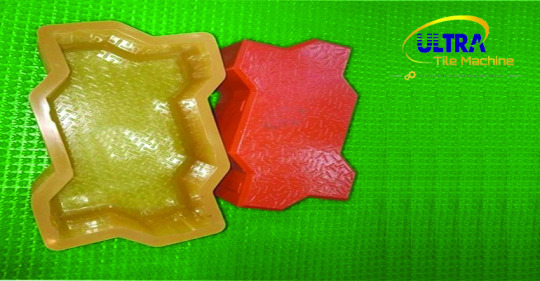
#Concrete Block Making Machine Manufacturers#Fly Ash Brick Making Machine Manufacturers#PVC Rubber Mould Manufacturers#paver block machine manufacturers
0 notes
Text
Competitive Analysis
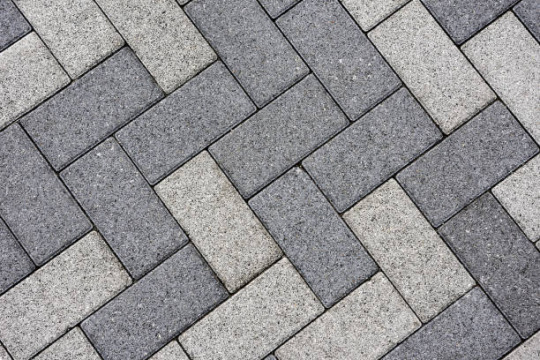
Paver blocks are a popular choice in the construction market because of their durability, versatility, and ability to create visually appealing surfaces. They are used in driveways, walkways, patios, and more. Recently, eco-friendly innovations like the BioBlock, made from coconut fiber and rice husk ash (RHA), have entered the market as sustainable alternatives to traditional pavers.
The direct competitors of BioBlock are traditional paver block manufacturers. These companies produce concrete and clay pavers, which are widely used due to their proven strength and long-standing market presence. Indirect competitors include natural stone and wooden flooring installers. These alternatives offer unique aesthetics and are preferred by customers seeking a more natural or rustic appearance for their spaces.
BioBlock has the potential to prevail in the market because of its competitive pricing, eco-friendly performance, and impressive strength. Its sustainable design appeals to environmentally conscious consumers while maintaining the durability required for heavy use. By addressing both affordability and performance, BioBlock can carve a unique space in the construction industry.
0 notes